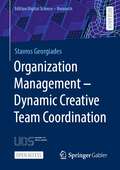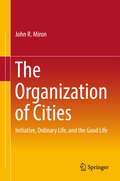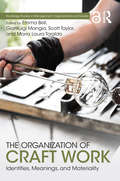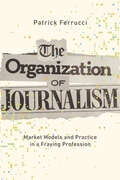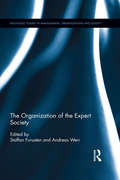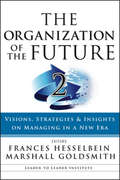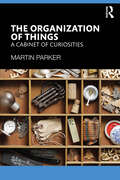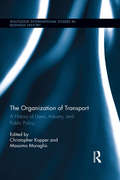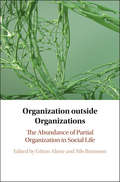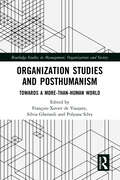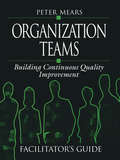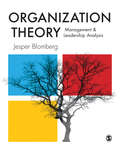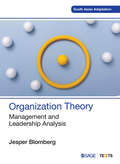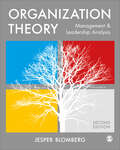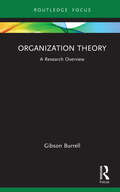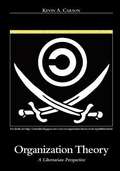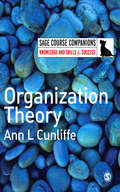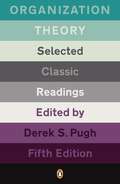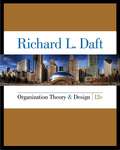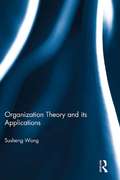- Table View
- List View
Organization Management – Dynamic Creative Team Coordination (Edition Digital Science)
by Stavros GeorgiadesThis open access book, through an in-depth process study of the interactions of two creative groups (film production crew) in temporary organizations during two media projects, explores how a team developmental process unfolds and proposes a model illustrating how the groups repeatedly change formation so that individuals can manage job interdependencies and new issues arising while developing, building up, and synthesizing new ideas into a final creative solution. This theory on creative group dynamic coordination builds theory on how and why creative groups coordinate, challenges assumptions about the role of formal structures and informal practices by demonstrating how the two dynamically interact and complement each other to facilitate coordination via the emergence of what one would expect to be “un-coordinated methods”, and provides an alternative perspective to the stages the groups have to go through by emphasizing a cyclical and not a linear team developmental process.
The Organization of Cities: Initiative, ordinary life, and the good life
by John R MironThis book focuses on the relationship between the state and economy in the development of cities. It reviews and reinterprets fundamental theoretical models that explain how the operation of markets in equilibrium shapes the scale and organization of the commercial city in a mixed market economy within a liberal state. These models link markets for the factors of production, markets for investment and fixed capital formation, markets for transportation, and markets for exports in equilibrium both within the urban economy and the rest of the world. In each case, the model explains the urban economy by revealing how assumptions about causes and structures lead to predictions about scale and organization outcomes. By simplifying and contrasting these models, this book proposes another interpretation: that governance and the urban economy are outcomes negotiated by political actors motivated by competing notions of commonwealth and the individual desire for wealth and power. The book grounds its analysis in economic history, explaining the rise of commercial cities and the emergence of the urban economy. It then turns to factors of production, export, and factor markets, introducing and parsing the Mills model, breaking it down into its component parts and creating a series of simpler models that can better explain the significance of each economic assumption. Simplified models are also presented for real estate and fixed capital investment markets, transportation, and land use planning. The book concludes with a discussion of linear programming and the Herbert- Stevens and the Ripper-Varaiya models. A fresh presentation of the theories behind urban economics, this book emphasizes the links between state and economy and challenges the reader to see its theories in a new light. As such, this book will be of interest to scholars, students, and practitioners of economics, public policy, public administration, urban policy, and city and urban planning. >
The Organization of Craft Work: Identities, Meanings, and Materiality (Routledge Studies in Management, Organizations and Society)
by Scott Taylor Emma Bell Gianluigi Mangia Maria Laura ToraldoThis edited book focuses on the organization and meaning of craft work in contemporary society. It considers the relationship between craft and place and how this enables the construction of a meaningful relationship with objects of production and consumption. The book explores the significance of raw materials, the relationship between the body, the crafted object and the mind, and the importance of skill, knowledge and learning in the making process. Through this, it raises important questions about the role of craft in facing future challenges by challenging the logic of globalized production and consumption. The Organization of Craft Work encompasses international analyses from the United States, France, Italy, Australia, Canada, the UK and Japan involving a diverse range of sectors, including brewing, food and wine production, clothing and shoe making, and perfumery. The book will be of interest to students and academic researchers in organization studies, marketing and consumer behaviour, business ethics, entrepreneurship, sociology of work, human resource management, cultural studies, geography, and fashion and design. In addition, the book will be of interest to practitioners and organizations with an interest in the development and promotion of craft work.
The Organization of Journalism: Market Models and Practice in a Fraying Profession
by Patrick FerrucciNew business models have splintered journalists’ once-monolithic professional culture. Where the organization once had little sway in the newsroom, in today’s journalism ecosystem, owners and management influence newsgathering more than ever. Using rich interviews and participant observation, Patrick Ferrucci examines institutions with funding mechanisms that range from traditional mogul ownership and online-only nonprofits to staff-owned cooperatives and hedge fund control. The variations in market models have frayed the tenets of professionalization, with unique work cultures emerging from each organization’s focus on its mission and the implantation of its own processes and ethical guidelines. As a result, the field of American journalism no longer shares uniform newsgathering practices and a common identity, a break with the past that affects what information we consume today and what the press will become tomorrow. An inside look at a fracturing profession, The Organization of Journalism illuminates the institution’s expanding impact on newsgathering and the people who practice it.
The Organization of Labour Markets: Modernity, Culture and Governance in Germany, Sweden, Britain and Japan (Routledge Explorations in Economic History)
by Bo StrathThere have been dramatic shifts in the behaviour of labour markets and the conduct of industrial relations in the last century. This volume explores these changes in the context of four very different societies: Germany, Sweden, Britain and Japan. However, despite their manifest differences, the author demonstrates that for long periods their labour markets were similar in many crucial respects. The book discusses: * the failure of neo-corporatism in Britain in the 1970's and the subsequent rise of Thatcherism; * the rise of Japan as a model for orderly industrial relations in the 1970's * the collapse of the German and the success of the Swedish labour markets in the 1930's.
The Organization of the Expert Society (Routledge Studies in Management, Organizations and Society)
by Andreas Werr Staffan FurustenIt is often claimed that we live in an expert society, a society where more and more individuals take expert roles in increasingly narrow fields. In contrast to more traditional experts most of these new experts lack generally accepted mechanisms for the certification and legitimation of their expertise. This book focuses on these new as well as established experts and the efforts undertaken to secure and legitimate their expertise. We view these efforts as organizing attempts and study them on four different levels – the society, the market, the organization and the individual. Based on empirical studies on these four levels of analysis, The Organization of the Expert Society makes the argument that current organizing initiatives in the expert society are based in an objectifying view of expertise that risks concealing and downplaying key aspects of expertise. Well-intended organizing initiatives in the expert society thus run the risk of promoting ignorance rather than securing expertise. Focusing on a current, general and global phenomenon, the rise and organization of an expert society. The Organization of the Expert Society will be key reading for scholars, academics and policy makers in the management fields of Organizational Theory, Management Consulting, Organizations & Society, Critical Management Studies as well as the disciplines of Sociology, Political Science and Social Anthropology.
The Organization of the Future: Winning Through Transformation
by John P. KotterThe rate of change in the business world is not going to slow down anytime soon. If anything, competition in most industries will probably speed up over the next few decades. This chapter considers the qualities that will be essential to winning in the twenty-first century. This chapter was originally published as Chapter 11 of "Leading Change."
The Organization of the Future 2: Visions, Strategies, and Insights on Managing in a New Era
by Frances Hesselbein Marshall GoldsmithWith 26 inspiring chapters, this book celebrates the wisdom of some of the most recognized thought leaders of our day: emerging and established experts who share their unique vision of what the organization of the future should look like and must do to survive in the turbulent 21st Century. <P><P> Outsmart Your Rivals by Seeing What Others Don't, Jim Champy Organization Is Not Structure but Capability, Dave Ulrich & Norm Smallwood The Leader's Mandate: Create a Shared Sense of Destiny, James M. Kouzes & Barry Z. Posner A Different Kind of Company, Srikumar S. Rao Free to Choose: How American Managers Can Create Globally Competitive Workplaces, James O'Toole Managing the Whole Mandate for the Twenty-First Century: Ditching the Quick-Fix Approach to Management, Paul Borawski & Maryann Brennan The Values That Build a Strong Organization, Thomas J. Moran Revisiting the Concept of the Corporation, Charles Handy Mobilizing Emotions for Performance: Making the Most of the Informal Organization, Jon R. Katzenbach & Zia Khan Beyond Retirement: Mature Workers Are Essential Talent for Organizations of the Future, Richard J. Leider The Best Hope for Organizations of the Future: A Functioning Society, Ira A. Jackson Reframing Ethics, Spirit, and Soul, Lee G. Bolman &Terrence E. Deal Environment Drives Behavior and Expectations, Bill Strickland with Regina Cronin Dynamic Organizations for an Entrepreneurial Age, Christopher Gergen & Gregg Vanourek Multidimensional, Multinational Organizations of the Future, Jay R. Galbraith Designing Organizations That Are Built to Change, Edward E. Lawler III & Christopher G. Worley Refounding a Movement: Preparing a One-Hundred- Year-Old Organization for the Future, Kathy Cloninger Three Challenges Facing Nonprofits of the Future: People, Funding, and Strategy, Roxanne Spillett Pioneering the College of the Future: Building as We Walk, Darlyne Bailey The Organization of the Future Will Foster an Inclusive Environment, Lee Cockerell The Leader as Subculture Manager, Edgar H. Schein The New High-Performance, Horizontal Organization, Howard M. Guttman The Leadership Blueprint to Achieve Exponential Growth, David G. Thomson Leadership Judgment: The Essence of a Good Leader, Noel M. Tichy & Christopher DeRose The Leader of the Future, William A. Cohen Leadership by Perpetual Practice, Debbe Kennedy
The Organization of Things: A Cabinet of Curiosities
by Martin ParkerThis is a book about knowledge and how it is organized.The business school has captured ideas about organization, and reduced them to questions of formal structures, documented processes, logistics and operations. This book shows how the concept can be understood more generously by illuminating the fundamental importance of culture to our understanding of organization. Using the idea of a cabinet of curiosities, the author shows how we can learn a lot about authority from choirs of angels, about secrecy from shipping containers, or work from art galleries. In disorganizing categories, forcing unusual conjunctions, the work opens itself to organization studies and studies of organizing, as well as cultural sociology, human geography, and social theory.Bringing together arguments developed over the last two decades, this book brings together and updates work that will provide a unique and valuable reference for students and scholars of management and organization around the world.
The Organization of Transport: A History of Users, Industry, and Public Policy (Routledge International Studies in Business History)
by Massimo Moraglio Christopher KopperOver the past ten years, the study of mobility has demonstrated groundbreaking approaches and new research patterns. These investigations criticize the concept of mobility itself, suggesting the need to merge transport and communication research, and to approach the topic with novel instruments and new methodologies. Following the debates on the role of users in shaping transport technology, new mobility research includes debates from sociology, planning, economy, geography, history, and anthropology. This edited volume examines how users, policy-makers, and industrial managers have organized and continue to organize mobility, with a particularly attention to Europe, North America, and Asia. Taking a long-term and comparative perspective, the volume brings together thirteen chapters from the fields of urban studies, history, cultural studies, and geography. Covering a variety of countries and regions, these chapters investigate how various actors have shaped transport systems, creating models of mobility that differ along a number of dimensions, including public vs. private ownership and operation as well as individual vs. collective forms of transportation. The contributions also examine the extent to which initial models have created path dependencies in terms of technology, physical infrastructure, urban development, and cultural and behavioral preferences that limit subsequent choices.
Organization outside Organizations: The Abundance of Partial Organization in Social Life
by Göran Ahrne Nils BrunssonThe book explores how various social settings are partially organized even when they do not form part of a formal organization. It also shows how even formal organizations may be only partially organized. Professors Göran Ahrne and Nils Brunsson first established the concept of partial organization in 2011 and in doing so opened up a ground-breaking new field of organizational analysis. An academic community has since developed around the concept, and Ahrne and Brunsson have edited this collection to reflect the current state of inquiry in this burgeoning subject and to set an agenda for future research. Its chapters explain how organization is a salient feature in many social settings, including markets, interfirm networks, social movements, criminal gangs, internet communication and family life. Organization theory is much more relevant for the understanding of social processes than previously assumed. This book provides a new understanding of many social phenomena and opens up new fields for organizational analysis.
Organization Results: Creating Capabilities
by Jack Zenger Dave Ulrich Norm SmallwoodLeaders can and should deliver organization results and help others develop the skills they need to make that happen. This chapter addresses the questions: Do I have the right organization? and What can I do to ensure my organization has the capabilities required to achieve results?
Organization Studies and Posthumanism: Towards a More-than-Human World (Routledge Studies in Management, Organizations and Society)
by de Vaujany, François-Xavier Silvia Gherardi Polyana SilvaThis book aims at exploring the reception of critical posthumanist conversations in the context of Management and Organization Studies. It constitutes an invitation to de-center the human subject and thus an invitation to the ongoing deconstruction of humanism. The project is not to deny humans but to position them in relation to other nonhumans, more-than-humans, the non-living world, and all the “missing masses” from organizational inquiry. What is under critique is humanism’s anthropocentrism, essentialism, exceptionalism, and speciesism in the context of the Anthropocene and the contemporary crisis the world experiences. From climate change to the loss of sense at work, to the new geopolitical crisis, to the unknown effects of the diffusion of AI, all these powerful forces have implications for organizations and organizing. A re-imagination of concepts, theories, and methods is needed in organization studies to cope with the challenge of a more-than-human world.
Organization Teams: Building Continuous Quality Improvement Facilitator's Guide
by Peter MearsThe facilitator's guide is a companion to Organization Teams: Building a Continuous Quality Improvement. This guide provides lesson plans, including suggested time allocation, masters that can be used to create your own transparencies, quality bucks photocopy masters, a method for randomly assigning participants to teams, a "little instructor" who will offer suggstions and share ideas.
Organization Theory: Management and Leadership Analysis
by Jesper BlombergIn Organization Theory: Management and Leadership Analysis, Jesper Blomberg explores the fields of organization theory and management, making sense of complex theories and encouraging critical thinking. The book analyses organizations through four theoretical frameworks, offering students a clear structure they can use to understand complex organizational issues: · the structural framework · the Human Resources framework · the power framework · the symbolic framework Each framework is explored by a chapter covering the basics, followed by a more advanced chapter so that students can deepen their understanding. A case study at the end of the book draws together theory and practice, giving students the opportunity to apply what they have learnt to a real management situation. This book is suitable for undergraduate and postgraduate students studying Organization Theory and Management. The book is complemented by a range of online resources including PowerPoint slides, an Instructor&’s Manual and Testbank.
Organization Theory: Management and Leadership Analysis
by Jesper BlombergIn Organization Theory: Management and Leadership Analysis, Jesper Blomberg explores the fields of organization theory and management, making sense of complex theories and encouraging critical thinking. The book analyses organizations through four theoretical frameworks, offering students a clear structure they can use to understand complex organizational issues: · the structural framework · the Human Resources framework · the power framework · the symbolic framework Each framework is explored by a chapter covering the basics, followed by a more advanced chapter so that students can deepen their understanding. A case study at the end of the book draws together theory and practice, giving students the opportunity to apply what they have learnt to a real management situation. This book is suitable for undergraduate and postgraduate students studying Organization Theory and Management. The book is complemented by a range of online resources including PowerPoint slides, an Instructor&’s Manual and Testbank.
Organization Theory: Management and Leadership Analysis
by Jesper BlombergIn Organization Theory: Management and Leadership Analysis, Jesper Blomberg explores the fields of organization theory and management, making sense of complex theories and encouraging critical thinking. The book analyses organizations through four theoretical frameworks, offering students a clear structure they can use to understand complex organizational issues: the structural framework the Human Resources framework the power framework the symbolic framework Each framework is explored by a chapter covering the basics, followed by a more advanced chapter so that students can deepen their understanding. A case study at the end of the book draws together theory and practice, giving students the opportunity to apply what they have learnt to a real management situation. This book is suitable for undergraduate and postgraduate students studying Organization Theory and Management. The book is complemented by a range of online resources including PowerPoint slides, an Instructor's Manual and Testbank.
Organization Theory: Management and Leadership Analysis
by Jesper BlombergIn Organization Theory: Management and Leadership Analysis, Jesper Blomberg explores the fields of organization theory and management, making sense of complex theories and encouraging critical thinking. The book analyses organizations through four theoretical frameworks, offering students a clear structure they can use to understand complex organizational issues: · the structural framework · the Human Resources framework · the power framework · the symbolic framework Each framework is explored by a chapter covering the basics, followed by a more advanced chapter so that students can deepen their understanding. A case study at the end of the book draws together theory and practice, giving students the opportunity to apply what they have learnt to a real management situation. This book is suitable for undergraduate and postgraduate students studying Organization Theory and Management. The book is complemented by a range of online resources including PowerPoint slides, an Instructor’s Manual and Testbank. Jesper Blomberg is Associate Professor at the Stockholm School of Economics, Sweden.
Organization Theory: Management and Leadership Analysis
by Jesper BlombergIn Organization Theory: Management and Leadership Analysis, Jesper Blomberg explores the fields of organization theory and management, making sense of complex theories and encouraging critical thinking. The book analyses organizations through four theoretical frameworks, offering students a clear structure they can use to understand complex organizational issues: · the structural framework · the Human Resources framework · the power framework · the symbolic framework Each framework is explored by a chapter covering the basics, followed by a more advanced chapter so that students can deepen their understanding. A case study at the end of the book draws together theory and practice, giving students the opportunity to apply what they have learnt to a real management situation. This book is suitable for undergraduate and postgraduate students studying Organization Theory and Management. The book is complemented by a range of online resources including PowerPoint slides, an Instructor’s Manual and Testbank. Jesper Blomberg is Associate Professor at the Stockholm School of Economics, Sweden.
Organization Theory: A Research Overview (State of the Art in Business Research)
by Gibson BurrellThis shortform book presents an overview of theoretical and empirical work in the field of organization theory. In doing so, it both provides a critical analysis of the state of knowledge in the field and offers recommendations for future directions. It is about both thinking differently, and considering what is already known within Organization Theory. With coverage of the foundations of organisation studies, the importance of bureaucracy, and insights into institutional approaches, the book also makes space to consider the key role of alternatives in the development of the field. A panoply of modes of organizing the modern economy and civil society have arisen wherein it is often said that the platform has replaced the pyramid. Yet, in 2022, the pandemic underscores the state’s responsibility to maintain public health through centralized and coherent organization rather than outsourcing, subcontracting and the gig economy. The book offers a new direction for research focusing upon ‘organizational camouflage’, where the unmasking of the large hierarchical corporation’s enduring role in governing our everyday lives would become Organization Theory’s revelatory task. Organization Theory: A Research Overview will be of value to researchers, scholars and students in the fields of business and management, especially those interested in the intersection of politics and organizations.
Organization Theory: A Libertarian Perspective
by Kevin A. CarsonThis book applies the economic principles of individualist anarchism, as developed in Studies in Mutualist Political Economy, to the study of the large organization. It integrates the insights of mainstream organization theory into that framework, along with those of more radical thinkers like Ivan Illich, Paul Goodman, and R.A. Wilson.
Organization Theory: Images Of Organization/ Organization Theory/ A Very Short Fairly Interesting And Reasonably Cheap Book About Studying Organizations (SAGE Course Companions series)
by Ann L CunliffeThe SAGE Course Companion on Organization Theory is an accessible introduction to a challenging subject area. This book helps readers to extend their understanding of theories and make the connection between them and organizational practice. It will enhance their thinking skills in line with course requirements and provides support on how to revise for exams and prepare for and write assessed pieces. Readers are encouraged not only to think like a organizational theorist but also to think about the subject critically. Designed to compliment existing textbooks for the course, the companion provides: - Easy access to the key themes in Organizational Theory - Helpful summaries of the approaches taken by the main course textbooks - Sample questions and answers, with common themes that must always be addressed - Short vignettes and a case study that runs throughout the chapters - Guidance on the essential study skills required to pass the course - `Taking It Further' sections that suggest how readers can extend their thinking beyond the `received wisdom' The SAGE Course Companion in Organizational Theory is much more than a revision guide for undergraduates; it is an essential tool that will help readers take their course understanding to new levels and help them achieve success in their undergraduate course. Instructor resources are available for this title. Please click here to contact your Sales Representative for more information.
Organization Theory: Selected Classic Readings
by Derek S. PughThis book spans seventy years of theory from Max Weber's seminal writings on bureaucratic organization to the latest management thinking represented by Handy, Peters and Waterman. Covering three main areas of interest, those of the structure of organizations, management and decision making, as well as that of organizational behaviour, this thoroughly revised and updated edition contains a vast amount of new contributions. It is a widely acknowledged text in its field, and an essential handbook for all those it concerns. It has also been announced as a core text for Open University courses from January 2008.
Organization Theory And Design
by Richard L. DaftDiscover the most progressive thinking about organizations today as acclaimed author Richard Daft balances recent, innovative ideas with proven classic theories and effective business practices. Daft's best-selling ORGANIZATION THEORY AND DESIGN presents a captivating, compelling snapshot of contemporary organizations and the concepts driving their success that will immediately engage any reader. Recognized as one of the most systematic, well-organized texts in the market, ORGANIZATION THEORY AND DESIGN helps both future and current managers thoroughly prepare for the challenges of today's business world. This revision showcases some of today's most current examples and research alongside time-tested principles. Readers see how many of today's well-known organizations thrive amidst a rapidly changing, highly competitive international environment. New learning features provide opportunities for readers to apply concepts and refine personal business skills and insights.
Organization Theory and its Applications
by Susheng WangOrganization theory is a fast developing field of microeconomics. Organizational approaches are now used in a wide range of topics in business studies. They are based on information economics, contract theory and mechanism design. This book introduces such organizational approaches and how to adopt them as business applications. The book presents the theory in the first two chapters and proceeds to cover the applications of the theory in the later three chapters. The theory lays the foundation and the applications illustrate how the theory can be used in a wide range of business problems. The book covers many concepts and ideas in organization theory, including complete contracts, incomplete contracts, allocation of control rights, option contracts, convertibles, and joint ventures concisely. It will be of use to third year undergraduates and above, Master’s and Ph.D levels for students in business schools.
